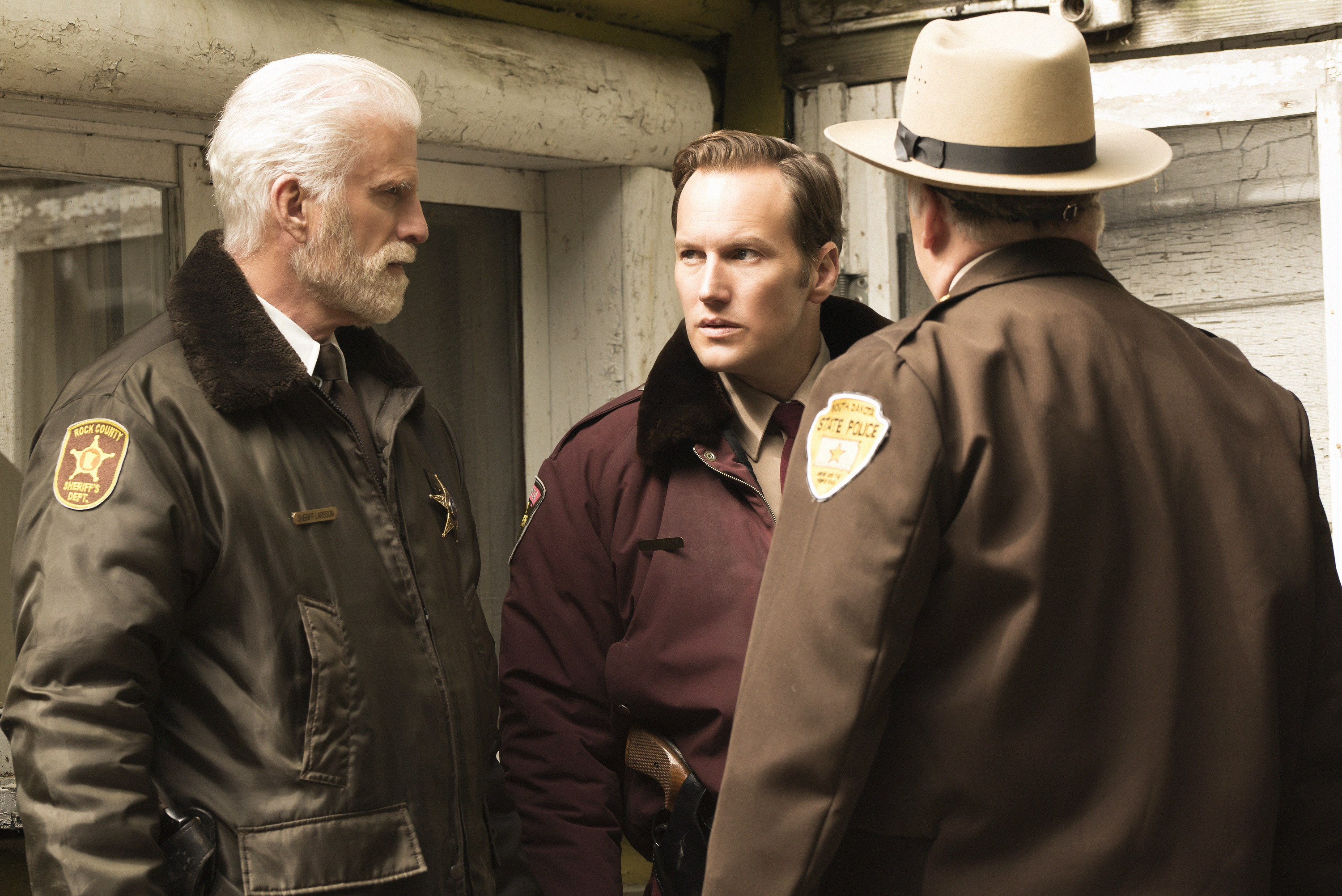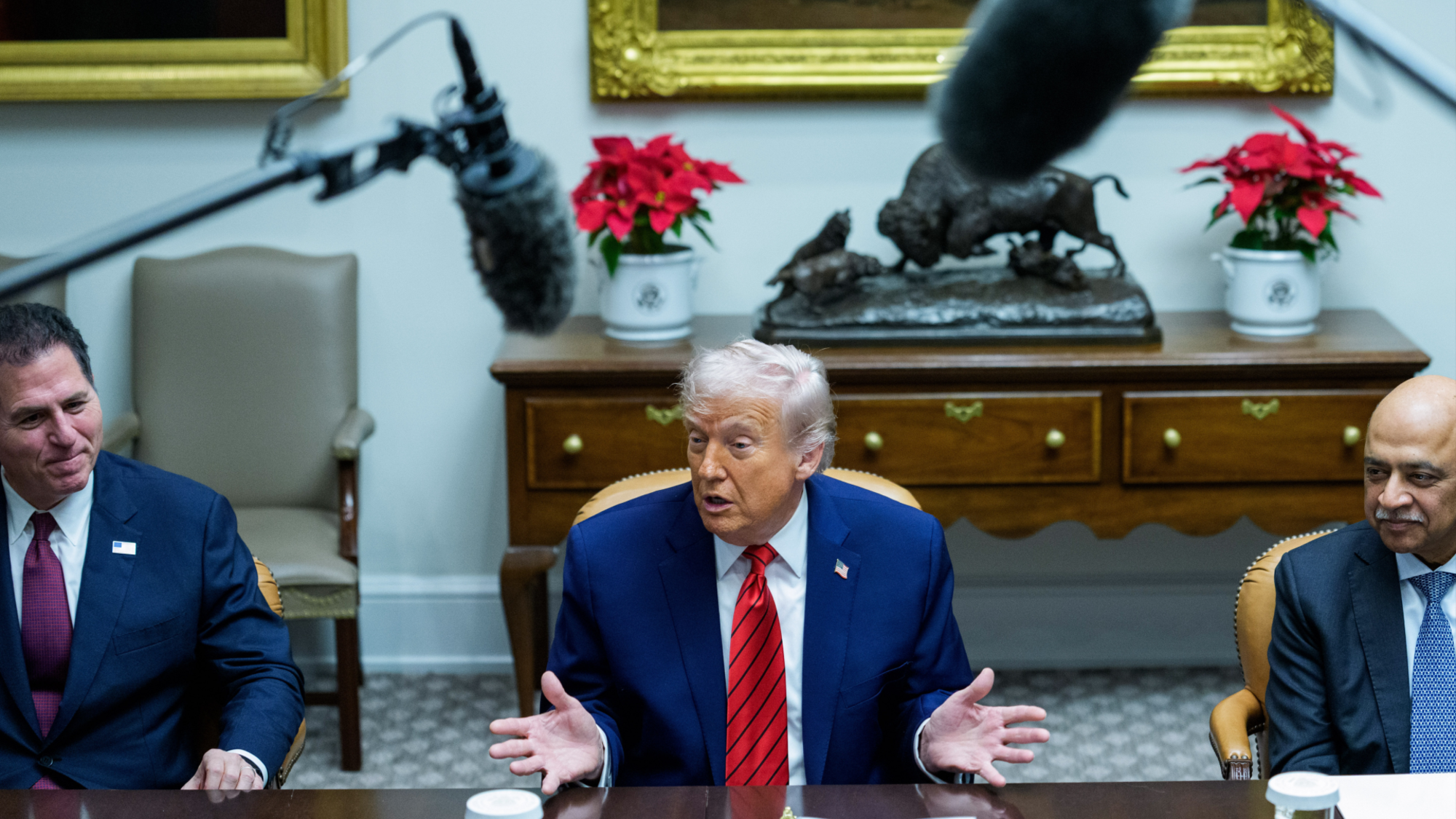Fargo and the history of true crime in the Midwest
As the second season finally arrives at the climactic Massacre at Sioux Falls, Fargo introduces a fascinating new narrative device that hints at a much grander future


Every week, Fargo opens by reminding the audience that this is a true story — a device borrowed from the original Coen brothers film, and faithfully recreated for the TV series. But this week's "The Castle" — the penultimate episode of the FX drama's second season — adds a fascinating new wrinkle to the now-familiar opening.
As the episode begins, a beat-up hardcover titled The History of True Crime in the Midwest is pulled from an overstuffed bookshelf. The pages flip open to reveal that the entirety of the second season has been just a single chapter of a much grander history book, complete with contextual historical asides and full-color drawings of the various murder victims we've met throughout the season. "And so we come to perhaps the bloodiest chapter in the long and violent history of the region," says the narrator (voiced unmistakably by season one alum Martin Freeman). "It is commonly referred to by lay people as the 'Massacre at Sioux Falls.'"
The appearance of The History of True Crime in the Midwest is the realization of something Fargo creator Noah Hawley has been discussing, in principle, for a long time. In interview after interview following the show's acclaimed first season, Hawley described his grand version for Fargo as a kind of history book. "I like the image that there's a big book out there — that's leatherbound with illustrations — that's The History of True Crime in the Midwest," he said at the Television Critics' Association press tour in 2014. "And the movie was chapter one. And the story we just told is chapter two. And we can do just another chapter."
The Week
Escape your echo chamber. Get the facts behind the news, plus analysis from multiple perspectives.

Sign up for The Week's Free Newsletters
From our morning news briefing to a weekly Good News Newsletter, get the best of The Week delivered directly to your inbox.
From our morning news briefing to a weekly Good News Newsletter, get the best of The Week delivered directly to your inbox.
As we learn in "The Castle," Fargo's second season isn't chapter three after all; it's chapter 14, in a book that apparently chronicles every major outburst of violent crime in Minnesota, Wisconsin, Iowa, Nebraska, and North or South Dakota from 1825 to the present. Here — at the climax of the story, as Hanzee tricks the Gerhardt family into squaring off against the police in an incredibly violent shootout — we're invited to step back and consider the events of the season in the context of a much grander tapestry.
This is an incredibly bold and ambitious mission statement for Fargo, and a concept that could theoretically fuel an unlimited number of seasons. (A brief reference from Ben Schmidt — "It's Rapid City all over again!" — provides one of many possible jumping-off points for season three.)
But forget for a moment about future seasons of Fargo. What does this mean for the story we're watching now? The introduction of the narrator has a distinct effect on our understanding of the Fargo universe. Following God and extraterrestrials — which have each played a key role in Fargo's second season — this new framing device is the third omniscient figure Fargo has conjured up. Suddenly, we're not watching a crime drama anymore; we're watching a kind of documentary-style reenactment of a true-life crime, complete with a narrator freezing the action to provide full historical context for the Sioux Falls Massacre.
At worst, the effect adds a layer of unnecessary exposition. (Did we really need the narrator to explain Hanzee's possible motives for betraying the Gerhardt family?) But at best, it adds a sense of inevitability, turning the horrifying immediacy of the violent standoff between the Gerhardt family and the police — which sees the deaths of both Floyd and Bear Gerhardt — into something that feels almost preordained.
A free daily email with the biggest news stories of the day – and the best features from TheWeek.com
And most intriguingly of all, "The Castle" also shows the limitations of the historical record. For all the narration provided over the events of the episode, there's one key element of the Sioux Falls Massacre that isn't explained — or even acknowledged — by the narrator: the sudden appearance of a flying saucer over the Motor Motel.
I have to admit: Though UFOs have been a part of Fargo's narrative from the beginning of the second season, I'm surprised by the integral role they played in the much-vaunted Sioux Falls Massacre. As Bear Gerhardt prepares to strangle Lou to death, he's interrupted by a sudden burst of light from the flying saucer that appears overhead. The distraction is enough to turn the tides of several micro-conflicts: Lou grabs his gun and shoots Bear in the head, and Ed and Peggy use the interruption as a means to slip away from Hanzee.
This is the second time Fargo's UFO motif has moved from the periphery of the season to have an actual, tangible impact on the narrative. The first time, the appearance of a flying saucer was enough to make Rye Gerhardt stop in the middle of the road, setting the stage for Peggy Blumquist to crash into him (and, in turn, setting the entire season in motion). This time, the flying saucer arrives just in time to save Lou's life, giving him just enough time to get the drop on Bear Gerhardt.
So what's the deal? Maybe aliens just hate the Gerhardts. But I think there's something a little more complicated going on. Earlier this year, I wrote about Fargo's bizarre UFO motif, which — like so many of the TV show's quirks — can be traced back to a Coen brothers movie. In this case, it's the closing monologue from 2001's The Man Who Wasn't There, which is worth quoting in full:
It's like pulling away from the maze. While you're in the maze, you go through willy-nilly, turning where you think you have to turn, and banging into the dead ends. One thing after another. But you get some distance on it, and all those twists and turns — why, they're the shape of your life. It's hard to explain, but seeing it whole gives you some peace.
Think about that quote from the perspective of Lou Solverson — the sole character to witness the crimes of Fargo's first season and its second. In "The Castle," we're catching Lou in one of the darkest chapters of his life — unable to stop a horrific outbreak of violence, and unaware, for the moment, that his cancer-stricken wife has collapsed (and is presumably on the brink of death).
But while Lou doesn't have the context for how his life can possibly continue after so much horror, we do. We're as omniscient as God or the aliens or the narrator. After all, we've already visited Lou's future: running a small diner while serving as a steadfast and loyal rock for both his daughter Molly and her stepdaughter. Thanks to Fargo's first season, we have enough distance to follow the twists and turns and recognize that in the end, he'll find some peace.
Read more Fargo recaps:
- Fargo: It's a mad, mad, mad, mad world
- Fargo and the weapons we choose
- Fargo and the fog of war
- The structural audacity of Fargo
- The radical women of Fargo
- Fargo and the myth of Sisyphus
- The truth is out there: The UFOs and aliens on FX's Fargo, explained
- Minnesota Nice vs. Evil: The moral universe of FX's remarkable Fargo
Scott Meslow is the entertainment editor for TheWeek.com. He has written about film and television at publications including The Atlantic, POLITICO Magazine, and Vulture.
-
 What role will Trump play in the battle over Warner Bros. Discovery?
What role will Trump play in the battle over Warner Bros. Discovery?Today’s Big Question Netflix and Paramount fight for the president’s approval
-
 ‘The menu’s other highlights smack of the surreal’
‘The menu’s other highlights smack of the surreal’Instant Opinion Opinion, comment and editorials of the day
-
 Education: More Americans say college isn’t worth it
Education: More Americans say college isn’t worth itfeature College is costly and job prospects are vanishing
-
 Walter Isaacson's 'Elon Musk' can 'scarcely contain its subject'
Walter Isaacson's 'Elon Musk' can 'scarcely contain its subject'The latest biography on the elusive tech mogul is causing a stir among critics
-
 Welcome to the new TheWeek.com!
Welcome to the new TheWeek.com!The Explainer Please allow us to reintroduce ourselves
-
 The Oscars finale was a heartless disaster
The Oscars finale was a heartless disasterThe Explainer A calculated attempt at emotional manipulation goes very wrong
-
 Most awkward awards show ever?
Most awkward awards show ever?The Explainer The best, worst, and most shocking moments from a chaotic Golden Globes
-
 The possible silver lining to the Warner Bros. deal
The possible silver lining to the Warner Bros. dealThe Explainer Could what's terrible for theaters be good for creators?
-
 Jeffrey Wright is the new 'narrator voice'
Jeffrey Wright is the new 'narrator voice'The Explainer Move over, Sam Elliott and Morgan Freeman
-
 This week's literary events are the biggest award shows of 2020
This week's literary events are the biggest award shows of 2020feature So long, Oscar. Hello, Booker.
-
 What She Dies Tomorrow can teach us about our unshakable obsession with mortality
What She Dies Tomorrow can teach us about our unshakable obsession with mortalityThe Explainer This film isn't about the pandemic. But it can help viewers confront their fears about death.
